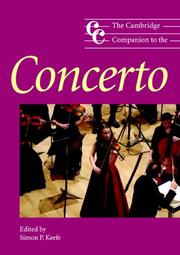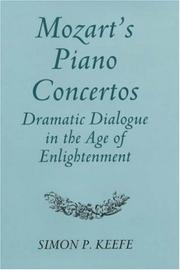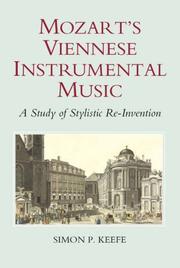| Listing 1 - 10 of 26 | << page >> |
Sort by
|

ISBN: 052154257X 052183483X 9780521834834 9780521542579 9781139000901 Year: 2005 Volume: *10 Publisher: Cambridge Cambridge University Press
Abstract | Keywords | Export | Availability | Bookmark
 Loading...
Loading...Choose an application
- Reference Manager
- EndNote
- RefWorks (Direct export to RefWorks)
concerto's --- instrumentenleer --- Music --- muziekgeschiedenis --- Concerto --- Concertos --- Concerto. --- Concertino --- Sinfonia concertante --- Symphonie concertante --- Musical form --- Concertante style --- History and criticism --- 78.64
Book
ISBN: 9780521663199 0521663199 9781139056038 9781107643970 Year: 2009 Publisher: Cambridge Cambridge University Press
Abstract | Keywords | Export | Availability | Bookmark
 Loading...
Loading...Choose an application
- Reference Manager
- EndNote
- RefWorks (Direct export to RefWorks)
Music --- anno 1700-1799 --- Musique --- History and criticism. --- Histoire et critique --- History and criticism --- Music - 18th century - History and criticism

ISBN: 085115834X Year: 2001 Publisher: Suffolk ; New York The Boydell Press
Abstract | Keywords | Export | Availability | Bookmark
 Loading...
Loading...Choose an application
- Reference Manager
- EndNote
- RefWorks (Direct export to RefWorks)
Book
ISBN: 0521807344 0521001927 9780521001922 9780511998706 9780521807340 Year: 2003 Publisher: Cambridge Cambridge University Press
Abstract | Keywords | Export | Availability | Bookmark
 Loading...
Loading...Choose an application
- Reference Manager
- EndNote
- RefWorks (Direct export to RefWorks)
The Cambridge Companion to Mozart paints a rounded yet focussed picture of one of the most revered artists of all time. Bringing the most recent scholarship into the public arena, this volume bridges the gap between scholarly and popular images of the composer, enhancing the readers' appreciation of Mozart and his extraordinary output, regardless of their prior knowledge of the music. Part I situates Mozart in the context of late eighteenth-century musical environments and aesthetic trends that played a pivotal role in his artistic development and examines his methods of composition. Part II surveys Mozart's works in all of the genres in which he excelled and Part III looks at the reception of the composer and his music since his death. Part IV offers insight into Mozart's career as a performer as well as theoretical and practical perspectives on historically informed performances of his music.
Mozart, Wolfgang Amadeus, --- Mozart, Wolfgang Amadeus --- Mozart, Johannes Chrysostomus Wolfgangus Theophilus --- Criticism and interpretation. --- Criticism and interpretation --- Biography --- Composers --- Austria --- 78.21.1 Mozart --- Mot︠s︡art, Volʹfgang Amadeĭ, --- Mōtsaruto, --- Mot︠s︡art, Iogann-Krizost Volʹfgang Gotlib, --- Mozart, Johann Chrysostom Wolfgang Amadeus, --- Mozart, W. A. --- Mozart, Wolfgango Amadeo, --- Mot︠s︡art, V. A. --- Mocartas, V. A., --- Motsart, Volphnkank Amedaios, --- Mot︠s︡art, Volfang Amadeus, --- Mozzart, Apollo, --- Mozart, Joannes Chrysostomus Wolfgangus Amadeus, --- Mozart, Johannes Chrisostomus Wolfgangus Theophilus, --- Mozhate, --- Моцарт, Вольфганг Амадей, --- מוצרט, --- מוצרט, וולפגנג אמדאוס, --- 莫札特, --- Mozart, Wolfgang Amadeusz, --- Mozart, Wolfgang Amadeus, - 1756-1791 - Criticism and interpretation --- Mozart, Wolfgang Amadeus, - 1756-1791 --- Mozart, W.A. --- Mot︠s︡art, Volʹfgang Amadeĭ --- Mot︠s︡art, Iogann-Krizost Volʹfgang Gotlib --- Mozart, Johann Chrysostom Wolfgang Amadeus --- Mozart, Wolfgango Amadeo --- Mocartas, V. A. --- Motsart, Volphnkank Amedaios --- Mot︠s︡art, Volfang Amadeus --- Mozzart, Apollo --- Mozart, Joannes Chrysostomus Wolfgangus Amadeus --- Mozart, Johannes Chrisostomus Wolfgangus Theophilus --- Mozhate --- Моцарт, Вольфганг Амадей --- Mozart, Wolfgang Amadeusz
Book
ISBN: 9781107532953 9780521198370 0521198372 9781139027021 9781139525503 1139525506 1139027026 9781139527897 1139527894 1139530178 9781139530170 9781139530170 1283521830 9781283521833 9786613834287 6613834289 1139526707 9781139526708 1139531360 9781139531368 1107532957 110722375X 113953954X Year: 2015 Publisher: Cambridge Cambridge University Press
Abstract | Keywords | Export | Availability | Bookmark
 Loading...
Loading...Choose an application
- Reference Manager
- EndNote
- RefWorks (Direct export to RefWorks)
Presenting a fresh interpretation of Mozart's Requiem, Simon P. Keefe redresses a longstanding scholarly imbalance whereby narrow consideration of the text of this famously incomplete work has taken precedence over consideration of context in the widest sense. Keefe details the reception of the Requiem legend in general writings, fiction, theatre and film, as well as discussing criticism, scholarship and performance. Evaluation of Mozart's work on the Requiem turns attention to the autograph score, the document in which myths and musical realities collide. Franz Xaver Süssmayr's completion (1791-2) is also re-appraised and the ideological underpinnings of modern completions assessed. Overall, the book affirms that Mozart's Requiem, fascinating for interacting musical, biographical, circumstantial and psychological reasons, cannot be fully appreciated by studying only Mozart's activities. Broad-ranging hermeneutic approaches to the work, moreover, supersede traditionally limited discursive confines.
Mozart, Wolfgang Amadeus, --- Mozart, Wolfgang Amadeus --- Criticism and interpretation --- Requiems. --- Requiems, Arranged --- Requiems (Mixed voices) --- Funeral music --- Masses

ISBN: 1282185713 9786612185717 1846155762 1843833190 Year: 2007 Publisher: Woodbridge, Suffolk, UK ; New York, NY : Boydell Press,
Abstract | Keywords | Export | Availability | Bookmark
 Loading...
Loading...Choose an application
- Reference Manager
- EndNote
- RefWorks (Direct export to RefWorks)
The music Mozart composed in Vienna closely examined, bringing out the processes of re-invention and re-formulation it displays. The stylistic evolution of Mozart's Viennese instrumental repertory as a whole [1781-1791] has never been systematically addressed. This book fills this gap through a study of stylistic re-invention, a practically- and empirically-based theory that explains how innovative, putatively inspired ideas take shape in Mozart's works and lead to stylistic re-formulation. The stylistic evolution of Mozart's Viennese instrumental repertory as a whole [1781-1791], closely tied to historical and contextual lines of enquiry, has yet to receive systematic attention. This book fills the gap through a study of stylistic re-invention, a practically- and empirically-based theory that explains how innovative, putatively inspired ideas take shape in Mozart's works and lead to stylistic re-formulation. Re-invention comprises a two-stage process: Mozart manipulates pre-existent stylistic features of his music to climactic effect, in so doing introducing a demonstrably 'new' stylistic dimension with broad aesthetic resonance; he subsequently re-appraises his style in response to the dimension in question. From close examination of a variety of Mozart's works [piano concertos, string quartets and symphonies in particular], supported by study of Mozart's other chamber and dramatic works, the author shows that stylistic re-invention is a consistent and coherent manifestation of stylistic development. Ultimately re-invention puts centre stage the interaction of intellectual and imaginative elements of Mozart's musical personality, accounting both for processes of reflection and re-appraisal and for striking conceptual leaps. SIMON P. KEEFE is James Rossiter Hoyle Chair of Music, University of Sheffield.
Instrumental music --- Analysis, appreciation. --- Mozart, Wolfgang Amadeus, --- Mozart, Wolfgang Amadeus --- Mozart, Johannes Chrysostomus Wolfgangus Theophilus --- Criticism and interpretation. --- Mot︠s︡art, Volʹfgang Amadeĭ, --- Mōtsaruto, --- Mot︠s︡art, Iogann-Krizost Volʹfgang Gotlib, --- Mozart, Johann Chrysostom Wolfgang Amadeus, --- Mozart, W. A. --- Mozart, Wolfgango Amadeo, --- Mot︠s︡art, V. A. --- Mocartas, V. A., --- Motsart, Volphnkank Amedaios, --- Mot︠s︡art, Volfang Amadeus, --- Mozzart, Apollo, --- Mozart, Joannes Chrysostomus Wolfgangus Amadeus, --- Mozart, Johannes Chrisostomus Wolfgangus Theophilus, --- Mozhate, --- Моцарт, Вольфганг Амадей, --- מוצרט, --- מוצרט, וולפגנג אמדאוס, --- 莫札特, --- Mozart, Wolfgang Amadeusz, --- Mozart, W.A. --- Mot︠s︡art, Volʹfgang Amadeĭ --- Mot︠s︡art, Iogann-Krizost Volʹfgang Gotlib --- Mozart, Johann Chrysostom Wolfgang Amadeus --- Mozart, Wolfgango Amadeo --- Mocartas, V. A. --- Motsart, Volphnkank Amedaios --- Mot︠s︡art, Volfang Amadeus --- Mozzart, Apollo --- Mozart, Joannes Chrysostomus Wolfgangus Amadeus --- Mozart, Johannes Chrisostomus Wolfgangus Theophilus --- Mozhate --- Моцарт, Вольфганг Амадей --- Mozart, Wolfgang Amadeusz --- MUSIC / History & Criticism. --- Chamber Music. --- Mozart. --- Music History. --- Piano Concertos. --- String Quartets. --- Stylistic Development. --- Stylistic Re-Invention. --- Symphonies. --- Viennese Instrumental Music.
Book
ISBN: 110837803X 1108378196 1316337758 1107116716 110753917X Year: 2017 Publisher: Cambridge : Cambridge University Press,
Abstract | Keywords | Export | Availability | Bookmark
 Loading...
Loading...Choose an application
- Reference Manager
- EndNote
- RefWorks (Direct export to RefWorks)
Mozart's greatest works were written in Vienna in the decade before his death (1781-1791). This biography focuses on Mozart's dual roles as a performer and composer and reveals how his compositional processes are affected by performance-related concerns. It traces consistencies and changes in Mozart's professional persona and his modus operandi and sheds light on other prominent musicians, audience expectations, publishing, and concert and dramatic practices and traditions. Giving particular prominence to primary sources, Simon P. Keefe offers new biographical and critical perspectives on the man and his music, highlighting his extraordinary ability to engage with the competing demands of singers and instrumentalists, publishing and public performance, and concerts and dramatic productions in the course of a hectic, diverse and financially uncertain freelance career. This comprehensive and accessible volume is essential for Mozart lovers and scholars alike, exploring his Viennese masterpieces and the people and environments that shaped them.
Composers --- Songwriters --- Musicians --- Mozart, Wolfgang Amadeus, --- Mozart, Wolfgang Amadeus --- Mozart, Johannes Chrysostomus Wolfgangus Theophilus --- Criticism and interpretation. --- Mot︠s︡art, Volʹfgang Amadeĭ, --- Mōtsaruto, --- Mot︠s︡art, Iogann-Krizost Volʹfgang Gotlib, --- Mozart, Johann Chrysostom Wolfgang Amadeus, --- Mozart, W. A. --- Mozart, Wolfgango Amadeo, --- Mot︠s︡art, V. A. --- Mocartas, V. A., --- Motsart, Volphnkank Amedaios, --- Mot︠s︡art, Volfang Amadeus, --- Mozzart, Apollo, --- Mozart, Joannes Chrysostomus Wolfgangus Amadeus, --- Mozart, Johannes Chrisostomus Wolfgangus Theophilus, --- Mozhate, --- Моцарт, Вольфганг Амадей, --- מוצרט, --- מוצרט, וולפגנג אמדאוס, --- 莫札特, --- Mozart, Wolfgang Amadeusz, --- Mozart, W.A. --- Mot︠s︡art, Volʹfgang Amadeĭ --- Mot︠s︡art, Iogann-Krizost Volʹfgang Gotlib --- Mozart, Johann Chrysostom Wolfgang Amadeus --- Mozart, Wolfgango Amadeo --- Mocartas, V. A. --- Motsart, Volphnkank Amedaios --- Mot︠s︡art, Volfang Amadeus --- Mozzart, Apollo --- Mozart, Joannes Chrysostomus Wolfgangus Amadeus --- Mozart, Johannes Chrisostomus Wolfgangus Theophilus --- Mozhate --- Моцарт, Вольфганг Амадей --- Mozart, Wolfgang Amadeusz
Book
ISBN: 1316848485 1316850838 1316853284 1107181054 131663244X Year: 2019 Publisher: Cambridge : Cambridge University Press,
Abstract | Keywords | Export | Availability | Bookmark
 Loading...
Loading...Choose an application
- Reference Manager
- EndNote
- RefWorks (Direct export to RefWorks)
The vibrant intellectual, social and political climate of mid eighteenth-century Europe presented opportunities and challenges for artists and musicians alike. This book focuses on Mozart the man and musician as he responds to different aspects of that world. It reveals his views on music, aesthetics and other matters; on places in Austria and across Europe that shaped his life; on career contexts and environments, including patronage, activities as an impresario, publishing, theatrical culture and financial matters; on engagement with performers and performance, focusing on Mozart's experiences as a practicing musician; and on reception and legacy from his own time through to the present day. Probing diverse Mozartian contexts in a variety of ways, the contributors reflect the vitality of existing scholarship and point towards areas primed for further study. This volume is essential reading for students and scholars of late eighteenth-century music and for Mozart aficionados and music lovers in general.
Composers --- Mozart, Wolfgang Amadeus, --- Mozart, Wolfgang Amadeus --- Mozart, Johannes Chrysostomus Wolfgangus Theophilus --- Mot︠s︡art, Volʹfgang Amadeĭ, --- Mōtsaruto, --- Mot︠s︡art, Iogann-Krizost Volʹfgang Gotlib, --- Mozart, Johann Chrysostom Wolfgang Amadeus, --- Mozart, W. A. --- Mozart, Wolfgango Amadeo, --- Mot︠s︡art, V. A. --- Mocartas, V. A., --- Motsart, Volphnkank Amedaios, --- Mot︠s︡art, Volfang Amadeus, --- Mozzart, Apollo, --- Mozart, Joannes Chrysostomus Wolfgangus Amadeus, --- Mozart, Johannes Chrisostomus Wolfgangus Theophilus, --- Mozhate, --- Моцарт, Вольфганг Амадей, --- מוצרט, --- מוצרט, וולפגנג אמדאוס, --- 莫札特, --- Mozart, Wolfgang Amadeusz, --- Mozart, W.A. --- Mot︠s︡art, Volʹfgang Amadeĭ --- Mot︠s︡art, Iogann-Krizost Volʹfgang Gotlib --- Mozart, Johann Chrysostom Wolfgang Amadeus --- Mozart, Wolfgango Amadeo --- Mocartas, V. A. --- Motsart, Volphnkank Amedaios --- Mot︠s︡art, Volfang Amadeus --- Mozzart, Apollo --- Mozart, Joannes Chrysostomus Wolfgangus Amadeus --- Mozart, Johannes Chrisostomus Wolfgangus Theophilus --- Mozhate --- Моцарт, Вольфганг Амадей --- Mozart, Wolfgang Amadeusz
Book
ISBN: 1316390934 1316391736 1316392139 1316392333 1316391930 1107360056 1316391531 1107044235 1108458149 1316389723 9781316391532 9781107360051 9781316392133 9781316391938 9781107044234 Year: 2015 Publisher: Cambridge, United Kingdom
Abstract | Keywords | Export | Availability | Bookmark
 Loading...
Loading...Choose an application
- Reference Manager
- EndNote
- RefWorks (Direct export to RefWorks)
Cultural, historical and reception-related contexts are central to understanding Mozart, one of the greatest and most famous musicians of all time. Widening and refining the lens through which the composer is viewed, the essays in Mozart Studies 2 focus on themes, issues, works and repertories perennially popular among Mozart scholars of all kinds, pointing to areas primed for future study and also suitable for investigation by musicians outside the scholarly community. Following on from the first Mozart Studies volume, internationally renowned contributors bring new perspectives to bear on many of Mozart's most popular works, as well as the composer's letters, biography, and reception. Chapters are grouped according to topics covered and collectively affirm the vitality of Mozart scholarship and the significant role it continues to play in defining and redefining musicological priorities in general.
Mozart, Wolfgang Amadeus, --- Mozart, Wolfgang Amadeus --- Mozart, Johannes Chrysostomus Wolfgangus Theophilus --- Criticism and interpretation. --- Mot︠s︡art, Volʹfgang Amadeĭ, --- Mōtsaruto, --- Mot︠s︡art, Iogann-Krizost Volʹfgang Gotlib, --- Mozart, Johann Chrysostom Wolfgang Amadeus, --- Mozart, W. A. --- Mozart, Wolfgango Amadeo, --- Mot︠s︡art, V. A. --- Mocartas, V. A., --- Motsart, Volphnkank Amedaios, --- Mot︠s︡art, Volfang Amadeus, --- Mozzart, Apollo, --- Mozart, Joannes Chrysostomus Wolfgangus Amadeus, --- Mozart, Johannes Chrisostomus Wolfgangus Theophilus, --- Mozhate, --- Моцарт, Вольфганг Амадей, --- מוצרט, --- מוצרט, וולפגנג אמדאוס, --- 莫札特, --- Mozart, Wolfgang Amadeusz, --- Mozart, W.A. --- Mot︠s︡art, Volʹfgang Amadeĭ --- Mot︠s︡art, Iogann-Krizost Volʹfgang Gotlib --- Mozart, Johann Chrysostom Wolfgang Amadeus --- Mozart, Wolfgango Amadeo --- Mocartas, V. A. --- Motsart, Volphnkank Amedaios --- Mot︠s︡art, Volfang Amadeus --- Mozzart, Apollo --- Mozart, Joannes Chrysostomus Wolfgangus Amadeus --- Mozart, Johannes Chrisostomus Wolfgangus Theophilus --- Mozhate --- Моцарт, Вольфганг Амадей --- Mozart, Wolfgang Amadeusz
Book
ISBN: 1009254359 1009254340 1009254375 Year: 2023 Publisher: Cambridge : Cambridge University Press,
Abstract | Keywords | Export | Availability | Bookmark
 Loading...
Loading...Choose an application
- Reference Manager
- EndNote
- RefWorks (Direct export to RefWorks)
The first extended study of the combined reception of Haydn and Mozart in the long nineteenth century, this book generates new, holistic understandings of their musical, cultural and historical significance in the Germanic, French and Anglophone worlds. It places a wide range of written sources under the microscope, including serious and popular biographies, scholarship, musical and non-musical criticism, and a diverse body of fiction, and evaluates the impact of anniversary commemorations. Haydn and Mozart in the Long Nineteenth Century determines how reputations, images and narratives for the two composers converge, diverge, develop at different speeds, and influence one another. Countering received wisdom about Haydn's reputational decline and reassessing Mozart reception through consideration of a broad spectrum of publications, we hear Haydn and Mozart speaking to the long nineteenth century in more nuanced, powerful, and persuasive voices than previously recognized.
Haydn, Joseph, --- Mozart, Wolfgang Amadeus, --- Criticism and interpretation. --- Music appreciation.
| Listing 1 - 10 of 26 | << page >> |
Sort by
|

 Search
Search Feedback
Feedback About UniCat
About UniCat  Help
Help News
News